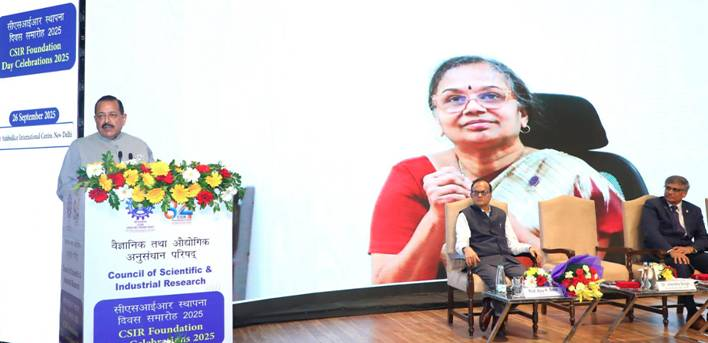CSIR Foundation Day: Dr. Jitendra Singh Stresses Tech Sovereignty for Viksit Bharat
Highlighting CSIR’s pan-India presence with 37 laboratories, Dr. Singh said the institution has played a transformative role in fields such as healthcare, pharmaceuticals, agriculture, aerospace, and defence.

- Country:
- India
Union Minister of State for Science and Technology and Vice President of CSIR, Dr. Jitendra Singh, has called technology sovereignty the new cornerstone of global power, stating, “Technology sovereignty will determine the geopolitical sovereignty in the times to come.” He was speaking at the 84th Foundation Day of the Council of Scientific and Industrial Research (CSIR) in New Delhi, where he emphasized the organization’s historic legacy, scientific achievements, and its crucial role in India’s vision for Viksit Bharat 2047.
CSIR: A Legacy Before Independence
Tracing CSIR’s origins to 1942, Dr. Singh reminded the audience that the institution was among the rare few national organizations founded before Independence, symbolizing India’s early commitment to scientific progress. He recalled the contributions of:
-
Dr. Syama Prasad Mookerjee, CSIR’s first vice-president, whose intellectual brilliance and role in shaping India’s academic landscape often remain overshadowed by his political career.
-
Sir Ramnath Chopra, widely regarded as the father of pharmacology in India, who laid the foundation of pharmaceutical research and nurtured generations of scientists.
“CSIR’s history is a reminder that science and innovation were integral to India’s journey even before freedom,” he said, underlining the role of science in the nation’s resilience and growth.
Present and Future: Building Strength in Emerging Technologies
Highlighting CSIR’s pan-India presence with 37 laboratories, Dr. Singh said the institution has played a transformative role in fields such as healthcare, pharmaceuticals, agriculture, aerospace, and defence. Initiatives such as One Week One Lab and One Week One Theme have been launched to bring its contributions closer to the public, making science more visible and accessible.
The Minister stressed that India must consciously strengthen its presence in emerging technologies such as artificial intelligence, quantum computing, biotechnology, and green energy if it is to remain competitive in the global arena.
From Lab to Marketplace: Strengthening Industry Collaboration
Industry linkages, Dr. Singh noted, have been central to CSIR’s success. He cited the example of Nafithromycin, the first indigenously developed antibiotic effective against drug-resistant respiratory infections, as a breakthrough made possible through collaboration.
“All of our success stories—from vaccines to floriculture—have been possible because of early and robust engagement with industry partners,” he said, urging the private sector to assume greater ownership of innovations. He called for stronger industry-academia partnerships to ensure that Indian innovations rapidly move from laboratory benches to commercial applications.
Science for Society: From Floriculture to National Security
Dr. Singh highlighted how CSIR’s work has not only advanced science but also transformed livelihoods:
-
Lavender cultivation in Jammu and Kashmir and tulip innovation in Palampur have revolutionized floriculture, boosting farmers’ incomes and finding recognition in national and international forums.
-
Sensors and devices for security operations, including those deployed in Operation Sindoor, have strengthened India’s defence capabilities.
“Our goal is to ensure that science improves ease of living and has a direct socio-economic impact,” he said, emphasizing that technology must serve the people at the grassroots level.
A Three-Pronged Approach: Awareness, Affordability, Accessibility
Outlining CSIR’s roadmap, Dr. Singh proposed a three-pronged approach:
-
Awareness – Enhancing scientific communication and public outreach using modern tools, including social media, so that citizens understand and value research.
-
Affordability – Ensuring technologies and innovations remain cost-effective and accessible to the common man.
-
Accessibility – Expanding the reach of CSIR’s innovations across regions and sectors to maximize socio-economic benefits.
He urged scientists to be proactive communicators, stating that visibility of their work is as important as its scientific merit in today’s world.
Global Engagement and Vision for 2047
The Foundation Day celebration was attended by prominent figures including Dr. V. K. Saraswat, Member, NITI Aayog; Prof. Ajay Kumar Sood, Principal Scientific Advisor to the Government of India; and Dr. Sethuraman Panchanathan, University Professor at Arizona State University and former Director of the U.S. National Science Foundation.
Looking ahead, Dr. Singh said CSIR must aspire to be the torchbearer of India’s technological rise as it moves toward its centenary in 2042. “The real tribute to our founding fathers will be to carry science to every section of society and lead the nation into 2047 with confidence and capability,” he concluded.
The 84th CSIR Foundation Day underscored the institution’s dual role: preserving its pioneering legacy while embracing future challenges in technology and innovation. By focusing on technology sovereignty, industry partnerships, and societal impact, CSIR is positioned to play a defining role in shaping India’s future as a technologically self-reliant and globally respected nation.
ALSO READ
India's Road to Sustainable Growth: Infrastructure Innovation
India Bids Farewell to MiG-21, Rajnath Singh Hails Legacy of Courage & Innovation
Mrinal Srivastava Returns to XED as Chief Technology Officer for AI-Driven Innovation
LTTS and Siemens Unite for Next-Gen Industrial Innovation
Tamil Nadu and Telangana Foster Educational Innovations










